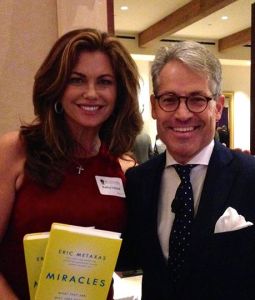Book Blog: Eric Metaxas on Miracles
Eric Metaxas, who, along with his wife Susanne, was honored as a Human Life Foundation Great Defender of Life (2013), has a new book out, Miracles: What They Are, Why They Happen, and How They Can Change Your life.
Metaxas is the author of the NY Times best-selling Bonhoeffer: Pastor, Martyr, Prophet, Spy and Amazing Grace: William Wilberforce and the Heroic Campaign to End Slavery, and the founder and host of the popular discussion series, Socrates in the City. He is also, as those who have heard him speak know, terrifically funny, hip, and able to reach across religious divides with his great appeal. Some seeing the bright yellow cover of this book might think it is sort of a light, “feel-good” book about miracles. Not so. While Miracles is a wonderfully engaging read, and sometimes fun, it is also challenging, disturbing, and fundamental: One cannot get much deeper than its subject matter, which really is the nature of God, the universe, and the faith claims of Christianity.
As Metaxas explains in his introduction, Miracles is sort of two books in one. Part one is an exploration of what miracles are, a critical examination, as in “can a rational person believe in miracles?” It goes on to examine the relationship between miracles and science. There is fascinating evidence here about the things we accept from science, as being in the “natural” order of things; at closer look, the natural order of things is itself … miraculous. Like the “Big Bang”: scientists point to the Big Bang as the creation of the universe out of nothing, yet have no explanation for how this explosion, as Metaxas writes, the “primal ka-boom,” was “so extremely and precisely controlled that we cannot really fathom it. Nothing human beings have ever been able to do can begin to approach the precision of it.”
Metaxas then goes on to examine the famous miracles in the Bible and look at them, again, critically and with historical evidence. He discounts, with historical and scriptural evidence, and with logic, such “nice story” re-writes by “biblical scholars” as the miracle of the loaves and fishes not being really that kind of miracle; it was a miracle because everyone decided to share the food they brought. If this were true, Metaxas writes, echoing the great apologists he so admires, C.S. Lewis, G.K. Chesterton (and St. Paul!), then there is no reason to believe in the Resurrection, and without that, “Christian faith is useless.” And he goes on to examine the Resurrection through the same lens of reason and evidence, answering the “explanations” given by skeptics (such as that Jesus’ body was stolen.)
The second part of the book contains accounts of miracles experienced by people Metaxas knows personally. As he explains, this adds a level of “trustworthiness” to their accounts, and also “underscores how tremendously prevalent such stories are.” There are stories of religious conversions, including Eric’s own, healings—one particularly moving story about a woman’s experience with healing from an abortion—and angel sightings. Of course we don’t have to believe them, but as Metaxas points out, “history comprises the subjective accounts of human beings; and from these subjective accounts we arrive at ‘objective’ truth—which is itself somehow and to some extent subjective.” Think about eyewitnesses, he says, at a criminal trial. The jury must hear the evidence and then decide the case.
This may well be a great way to sum up this book as a whole: Metaxas has given us the testimony of the nature of the universe, scripture, and then personal accounts from his contemporaries—and it is up to the reader to decide if the case has been made for the miraculous.
And why miracles? What makes a miracle is that “God performed it specifically to make himself known, to communicate with human beings. . . . People have their faith strengthened and deepened by miracles, and many people actually come to faith through miracles.”
Miracles is a book for believers and non-believers—anyone who thinks it is important to grapple with the big questions. In a live interview with Dick Cavett (for Socrates in the City on October 28) Metaxas said that he hopes the book will get people talking, and help bridge the gap in our culture between those who believe science is it–the be-all and end-all–and that religious belief is irrational, and those on the opposite side who hold to what Eric calls “dead religion,” having a rigidity about their beliefs that doesn’t allow them to struggle with doubt and mystery. Neither position, he said, leaves its adherents open to wonder. Wonder is key: “We must think about these things. We must wonder about them and about our lives and about life in general. It is healthy to wonder. We have a deep need for wondering.”
And I would end by saying we have a great need for books like Miracles.










